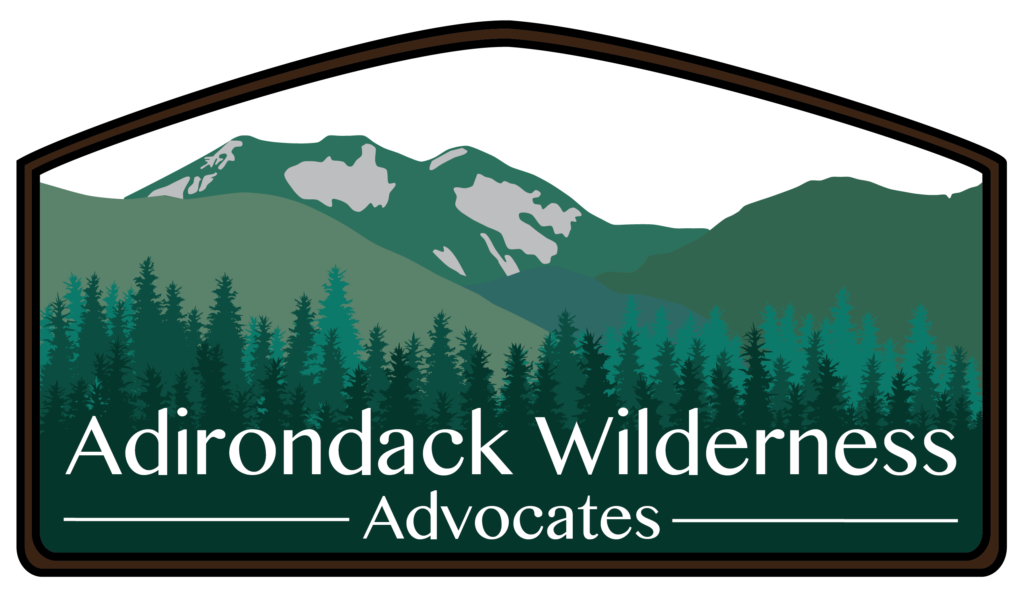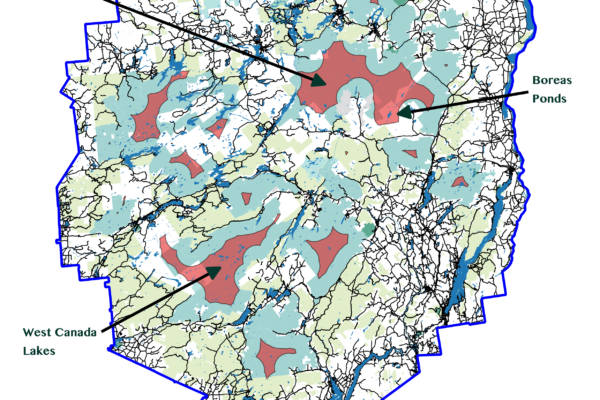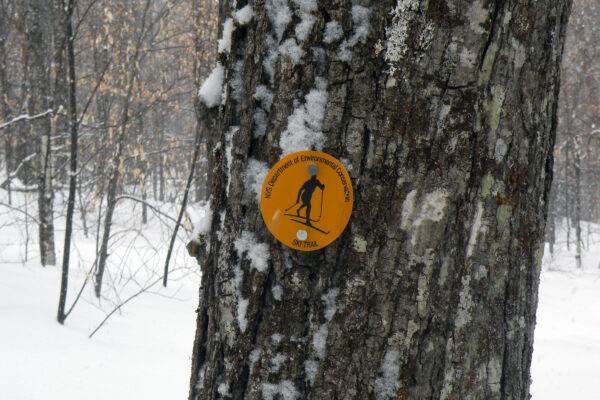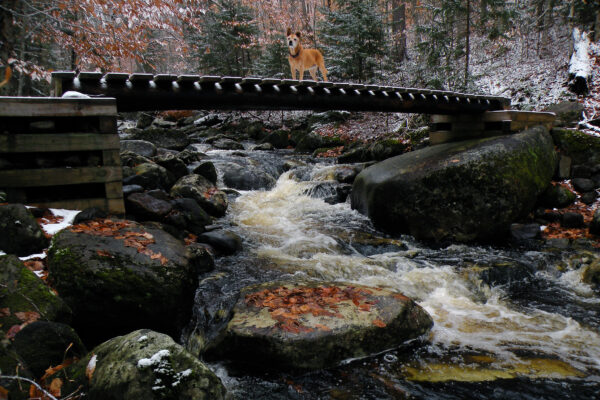MARCH 2008 – Lexie was not happy to be crossing the lake, and the further from shore we got the less happy she was becoming. She should have been the most sure-footed among us by virtue of anatomy, but despite her four clawed paws and her low center of gravity she was completely ill at ease stepping across the ice.
Thirteenth Lake was a patchy desert of glassy teal a mile long and half a mile wide, with clouds of textured snow blown and scattered across it by the wind. Large parts of it were sheer ice; apparently the surface had started to thaw not long ago, but then refroze into this mottled pattern. Paul and I stepped gingerly across the slippery stuff, taking short and controlled steps to minimize the chances of falling. We had to get across, or else take a longer circuit along the roads to get back to my car. The wind had been reduced to brief spurts, and rounded mountains rose back from the far shore.
Lexie had begun to express her doubts from the beginning about this crossing-the-lake business. It was slippery going; only the textured patches of snow offered good footing, and they were becoming increasingly scarce the further out from Elizabeth Point we ventured. I watched her; she really wasn’t slipping that much, and anyway she had the advantage over us. Her horizontal backbone and low profile meant that she had less of a distance to fall than her two bipedal companions.
“Paul,” I said, “Let’s take the short way across.”
He looked back at me doubtfully, and a little dismayed.
“The dog,” I said. “She isn’t doing well.” I tipped my head toward the far shoreline, indicating a shorter route across the width of the lake. “Let’s go that way, and then follow the shoreline back to the car.”
I saw that he had been heading straight out toward the north end of the lake, where my car was parked. Going that way would mean walking a long diagonal axis across the ice, prolonging the time we’d be out here. That wasn’t necessarily a bad prospect for us; this was a scenic place, with those mountains to admire and no wind to chill us. It offered a freedom from the enclosure of the forest.
“Uh huh,” was all he said as he adjusted course.
The sun was starting to hang low over the mountains to the west, and that far shoreline was now completely in shadow. This morning the wind had been blowing with an arctic chill that seemed rather harsh for late March. But it had died by mid-afternoon and the temperature was now much more comfortable.
Our new route was going to cut our projected time on the ice by half, but Lexie was still unimpressed. Only the immediate situation was on her mind. She was greeting each new expanse of teal-colored ice has though it had a tremendous potential for pain and misfortune, a place where dogs most certainly had no business being. Her ears were held out sideways, not perked up like when she is on the alert or tucked back as when she is at ease; and her posture was almost cowering, with her head at a slight bow. She was stepping with the utmost caution, and even when she successfully made it to the next patch of snow with hardly a slip the experience did little to assuage her doubts.
I found myself in the middle of the hiking order as one companion continued forward without hesitation and the other was slowly becoming paralyzed with fear. I let Paul get ahead of us as I held back to encourage Lexie across. I could see that this was going to take a while.

We were far out past the middle of the lake now, where the steady winds earlier in the day had left more ice than snow. I led the way, going slowly, trying to encourage her to follow at whatever pace she wanted to set.
“Hey, Lex. We’re almost there. We’re heading back to the car. We’ll get inside, turn the heat on, and stop at the hot dog store to get Lexie a hot dog!”
Persuasion was not working very well, and of course she wasn’t thinking far enough ahead to that customary Stewart’s hot dog she gets at the end of our hikes. She was seizing up with whatever strange new fear she had contracted, and even by walking slowly I was getting farther ahead of her. This in turn was making her even more nervous.
Those arabesques of old snow embedded in the lake ice were like island refuges, where the textured surface allowed us to step with confidence, brief though it may be. Lexie was coming to these patches and trying to follow them in whichever direction they happened to lead, even if it was the wrong direction; and since these patches were merely islands they were all dead ends anyway.
She stopped on one with yet another expanse of teal beyond, and she decided she had had enough. I watched as she hesitated and then began to turn back the way we had come—even though by this point we were much closer to the western shore, where we were headed.
“Where’re you going, Lex? I’m going this way. Okay, Lex. Let’s go this way. You can do it. Come on, pup.”
I had no way of knowing how old she really was; she was picked up as a stray in Canajoharie in April 2003, and everything before that date was merely a matter of speculation. The vet guessed she was probably two years old then, which would make her just about seven now. This is the age dogs begin to mellow, and begin to feel their limitations more than they ever did before. I had never seen Lexie this paralyzed with doubt and apprehension before.
When she saw that I was not following her back the way we had come, and that I was in fact still trying to convince her to continue forward, she stopped once again. But she was still very doubtful of my ability to lead her off the lake. She had not wanted to be on the lake in the first place.

We were heading towards the woods, towards solid ground and security, and in fact we were now almost there. I had arrived at the wide band of snow that the wind had left in the lee of the western shore—still on the lake, but completely off the ice. This band extended all the way down the west side of the lake. It would be a ribbon that we could follow back towards the car and our ride out of here. And if anyone was still nervous, then the safety of the woods would not be far away.
I had made it, and Lexie was about a hundred feet behind me. But she had stopped cold, looking at me as though across a wide gulf. She was on a narrow crescent of snow, and between us was one last expanse of glare ice. She lay down where she stood, her chin between her paws and her eyes wide with trepidation.
“Okay, Lex. It’s okay. Come on, over this way!” My mittened hand patted the ice beside me in a demonstration of its solidity, but it wasn’t the possibility of falling through that she feared. We might as well have been on opposite banks of a raging river. We had just crossed half a mile of frozen lake—albeit with extreme anxiety—but this last span of hard ice was an impassable no-dogs-land to her.
I wasn’t sure what I was going to do. By taking short, controlled steps I had crossed without a problem, and I knew she could too, but if she wasn’t going to cross on her own then I might have to carry her—and I couldn’t visualize that working well. Her weight would throw my own balance off if she started to squirm, and a hard fall wouldn’t do either of us any good.
It wasn’t like we had never been on frozen lakes before. She usually loved it. At Cat Mountain Pond, on a winter camping trip a few years ago, she had felt relieved and happy to be on the ice. We had trudged several miles to get there, and the woods were so full of deep snow that the frozen expanse of the pond was like a giant snow-free playground for her, a place where she could roam unencumbered. Granted, the ice wasn’t sheer that day like it was now, but there had been no fear whatsoever.
But there have been other times in the past when her fearlessness has gotten her into trouble. Twice I’d watched her misjudge the strength of the ice she was trotting across and take an unplanned spill. But she pulled herself out and carried on like nothing happened—and meanwhile, my heart resumed its regular beating. Both times. She was a pit bull, a tough dog by her own estimation and not one to pass up an adventure. The Hunter of Frogs, the Chewer of Sticks, the Champion of Tug-of-War, a dog with an 0-for-3 score to settle with the porcupines. But here she was being undone by half a mile of ice.
It was clear she was in a panic and needed me to be with her. So I re-crossed that gulf of glare ice, reminding her along the way that she was a good dog, we were best pals, and that it was my sworn duty to make sure no little dogs were left abandoned on Thirteenth Lake. I could see Paul nearly a quarter mile ahead down the shore, sitting on a rock and waiting for us to resolve this family crisis.
She remained in the same lying, submissive position until I reached her—and then there was a burst of affection and relief. She stood up and licked my face, with a furtive wag of her tail. She was breathing fast and hard, as though she had not been breathing at all during the ordeal. My presence and a reassuring touch were apparently all that were needed to improve her outlook. She was not being abandoned after all.
I had left my backpack sitting near the shore, and that gave us a definite goal to aim for. With a little further coaxing Lexie was able to walk gingerly across the ice on her own, with me beside her. Her apprehension melted instantly when she reached the band of snow, where traction was no longer an issue. Her ears perked for the first time since leaving Elizabeth Point, and she trotted self-assuredly towards the woods, apparently on the assumption that she held dominion again over anything that might be scurrying and scampering across the snow.
I picked up my backpack and followed her into the woods to lead the way down the shore towards Paul. Lexie was sniffing the snow as if she had only just been let outside after a long spell of indoor confinement. There were lots of things to investigate, and lots of news to catch up on. The woods had been busy in her absence. Ice was the farthest thing from her mind.
Rest assured, her moment of panic never happened. It was forgotten as soon as it ended.



